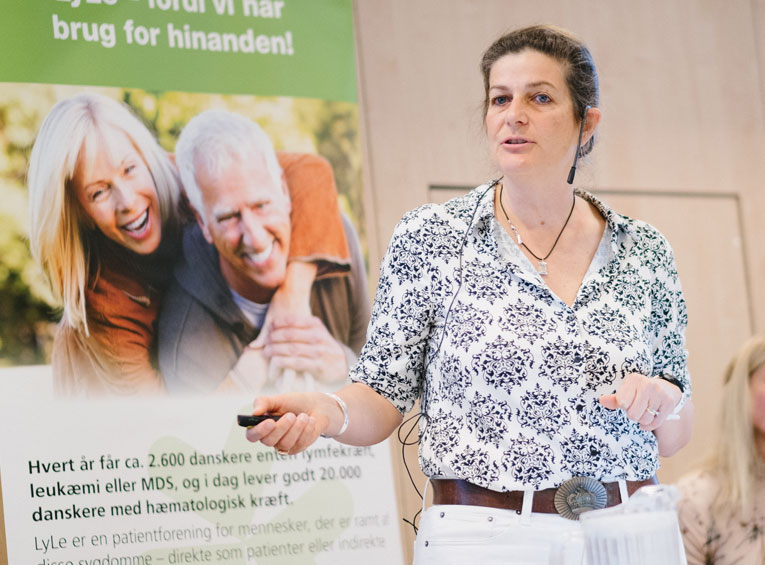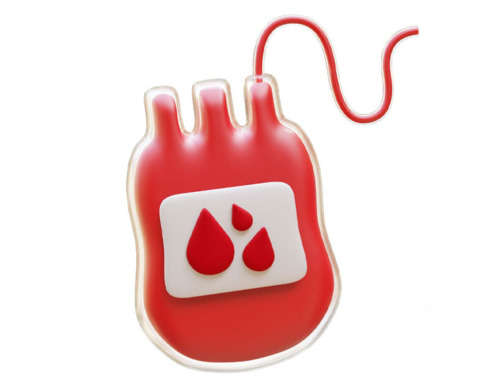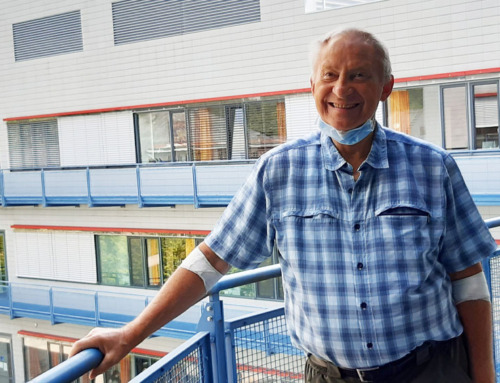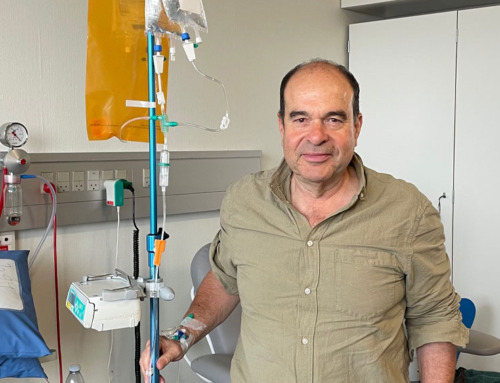Artiklen er på engelsk – findes også på dansk under overskriften: Behandlingen af CLL minder mere og mere om behandlingen af diabetes
The Israeli hematologist Dr. Tamar Tadmor was the keynote speaker at LyLe’s and Lymphoma Coalition’s CLL conference taking place in Copenhagen April 25. Dr. Tadmor gave an “overview and status of the treatment of CLL” to the more than 80 attending patients and relatives and she gave a look into a future of growing insights of the disease and still better treatments. Treatments that may be so potent that chemotherapy can be substituted by far less harmful and more targeted treatments.
Dr. Tamar Tadmor is a professor at Bnai Zion Medical Center in Haifa, Israel. She contributes to a large number of scientific articles on CLL and is a popular and sought-after lecturer among Israeli CLL patients. Dr. Tadmor speaks warmly and earnestly about the importance for each patient to know their own specific disease and the particular risk associated with it, this being her strongest motivation for giving so many lectures about CLL to patients and their relatives. We asked her to elaborate on the developments in the treatment of CLL over the past 10 years.
“For a long time, we have used a combination of different types of chemotherapy and antibodies (chemo-immunotherapy) in newly diagnosed CLL patients and in patients with relapse, and we still do so with a large proportion of patients,” she explains.
The choice is between different types of chemotherapy depending on how aggressive the disease is. The use of chemotherapy is a difficult balance between, on the one hand, prolonging the time to keep the disease away and, secondly, the side effects and long-term consequences that inevitably comes with chemotherapy.
“When we began to really understand the biology of the disease at the cellular level some 10 years ago, a process started that enabled us to develop still more targeted drugs that only attack the leukemia cells and not the healthy cells as well. We call it biological treatment.”
Why is that better?
“This is because these drugs do not attack healthy cells. Chemotherapy has in most patients some unpleasant side effects that appear very quickly, but for many patients it also gives devastating health complications later in life. Complications that severely impact the quality of life of the patient. We know that chemotherapy affects the DNA of each cell in the body and that some patients even develop a secondary disease (cancer) after chemotherapy. The new treatments are tablet formulation, and therefore the patients do not need to go to the hospital to get treatment but will typically only need to go to control visits at the hospital every three to four months. The new treatments are not only chemo-free, but also “doctor-free”. Patients gain in other words more autonomy,” emphasizes Dr. Tamar Tadmor.
Does this mean that the days of chemotherapy treatment in CLL will soon be over?
“We have many clinical studies comparing chemo-immunotherapy with the new biological drugs, and they give us indications that there is an advantage in treating without chemotherapy. The challenge, however, is that we do not have long-term follow-up on these data. So, we do not know if complications related to these new treatments will appear in maybe 5-7 years from now,” explains Dr. Tamar Tadmor.
“We are moving towards more and more tailor-made, personalized treatments and this will allow us to find the best treatment for each patient’s individual disease. In this process, we look closely at generic changes in the CLL cells and we check their mutation status. Abnormal chromosomes predict with great certainty disease development and prognosis in CLL.”
“This means that we, step by step, get more information about which drugs the individual patient should receive to ensure that he or she is disease-free for as long as possible. For example, we know, as something very tangible, that patients with 17P deletion should not have chemo-immunotherapy as it does not work in these patients. We also know that patients with 11q deletion typically respond very positively to both chemo-immunotherapy and to the new drugs. And we know that patients with Trisomy 12 CLL probably do not need to receive CD20 monoclonal antibodies. We therefore have more and more information about how we can customize treatment to the different subgroups of the disease and in this way give the patient the best treatment. In general, you can say that everything indicates that the new drugs will be relevant to all the known variations of the disease.”
Can you say a little more about the new drugs? What kind are they?
“There are two drugs that are available right now and more will follow. The two agents are ibrutinib and venetoclax, and the task right now is to investigate whether we should use them one at a time, in combination or, for example, in combination with antibodies, e.g. rituximab, in order to achieve the best results. At the same time, we look a lot at treatment durability – that is, how long does it take before the disease begins develop again. We also investigate whether it is necessary to provide treatment for lifetime or whether it is possible to stop treatment without the disease recurring.”
What do these treatments mean for patients’ quality of life?
“We see a pattern where the patients have fewer infections, which in the worst cases can be life-threatening, and thus less hospitalizations. At the same time being in tablet form, the new drugs are a great convenience to the patient who can selfmedicate. Overall, there is no doubt that the new treatments are of great importance to the quality of life. That is what the clinical studies show us.”
So where are we in this development right now?
“There is still a need for many studies of these drugs and the new ones to come, but overall we are in very exciting time for both patients and doctors. We have the new treatments that are already in use and many new ones coming up. They have in common the benefit that they seem to have few side effects – also in the long term – and that they are very effective.”
“The treatment of CLL is increasingly reminiscent of the treatment of hypertension (high blood pressure) or diabetes. We can control the disease with tablets, but unlike diabetes, at least some patients do not need to take them for life. It is a very exciting time.”
What do you think is the most important thing that patients and their relatives should be aware of in this context?
“The most important thing is to have a good and trusting communication with your doctor. And to talk to him or her about what is the best treatment for one’s specific disease. Patients today have access to a very large amounts of disease information via the Internet – independent of the healthcare system – and it can be very confusing and perhaps even negative to lean too much on that information. It is difficult, if not impossible, for the patient to distinguish between qualified information and unreliable on the internet. The doctor is the person who knows you and any other illness you might have.”
Is there a development in the way we do clinical studies today?
“The earliest studies compared chemotherapy in combination with various treatments. From there we moved to chemotherapy in combination with biological drugs, and now we compare the new drugs to each other, how they can possibly be combined, and what should be 1st and 2nd line treatment.”
Many patients are not treated immediately after diagnosis but remain under observation. This happens because doctors estimate that it is better to postpone treatment start until the disease has developed. Many patients find this frustrating. Will the new drugs change this; will CLL patients be treated at an early stage in the future?
“The doctors call it ‘wait and watch’ and the patients ‘wait and worry’, and the answer is that there are no arguments for changing the ‘wait and watch’ strategy – even with the new drugs. But it is a hot topic, and I understand that the patients are uneasy and that they find it scary every time they go to the hospital for their control visit. But the new drugs are not without side effects and complications. That is why we still prefer to wait and watch.”
In CML (chronic myeloid leukemia) it has been found possible – in clinical studies – to stop treatment for some patients without relapse. Will we see something similar in CLL?
“CLL is a chronic disease and we run marathons with our patients. Based on clinical studies, which have only lasted a few years, we cannot decide whether it will be possible at some point to stop treatment. What we are looking at now is what we call “minimal residual disease”, MRD. With patients that obtain MRD – the condition where the disease is no longer traceable – it can eventually be relevant to stop treatment within the frame of a clinical study. There are already studies with one of the new drugs, giving treatment in combination with rituximab for two years and then stopping. Here we see that some patients do not relapse and just need to be under observation. If they relapse at some point, we can start treatment again. But it is important to emphasize that we do not have long-term data and do not know if the disease will develop at a later stage. We, the doctors, are just cautiously talking about curing CLL, but we hope that this will happen when we use the tools at hand in the right combinations.”






